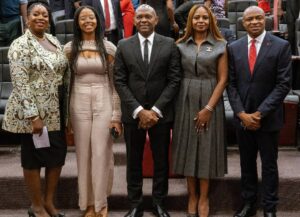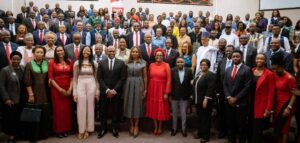Festus Keyamo, minister of aviation, says the recent move by the opposition coalition to adopt the African Democratic Congress (ADC) signifies the complete breakdown of the Peoples Democratic Party (PDP).
On Wednesday, ADC was announced as the official platform for the opposition coalition aiming to challenge President Bola Tinubu in the next election.
The event brought together politicians from major political parties, including the Labour Party (LP), PDP, and the ruling All Progressives Congress (APC).
Commenting on the development, Keyamo explained that under the law, no individual can belong to multiple political parties simultaneously, stating that the open declaration for ADC clearly shows the politicians involved have abandoned their former affiliations.
He said the development has strengthened the APC’s chances in the 2027 general election.
“The emergence of ADC as presently constituted marks the formal dismemberment of the PDP, hitherto Nigeria’s strongest opposition party,” he said.
“Majority of the old guard in the PDP (who have apparently lost control of the Party) have been pushed out of the party by the younger Turks within the PDP. That is why the gathering today was a conglomerate of ‘former this’ and ‘former that’ of the PDP.
“No matter how you look at it, this is just Atiku’s faction of PDP in desperate search for the 2027 presidential ticket — nothing more, nothing less.”
Keyamo pointed out that some APC members who joined ADC had either worked against Tinubu or lost their constituencies in the 2023 elections.
“Their movement takes nothing away from the APC; it is actually better for the party as it removes internal dissenters,” he said.
“The other addition to the so-called ‘coalition’ is a sprinkling of APC members who actually worked against President Bola Ahmed Tinubu in the last election and one or two APC leaders who lost their constituencies to opposition parties in 2023.”
He also discussed the political dynamics involving Peter Obi, the Labour Party’s 2023 presidential candidate, suggesting that the coalition leaders intend to benefit from Obi’s support base without granting him the presidential ticket.
Keyamo cautioned that denying Obi the ticket could cost the coalition his supporters, particularly in the south-east and south-south regions where Obi performed well in the last election.
“The person who the old, cunning guards want to take for a ride in all of this is Peter Obi. They want his votes, but don’t want to give him their Presidential ticket, because this is Atiku’s show simpliciter,” he added.
“That is why David Mark is the interim chairman. Those who know politics know what I am saying. But if you do not give Peter Obi the Presidential ticket, you lose his supporters.”

 BIG STORY20 hours ago
BIG STORY20 hours ago
 BIG STORY2 days ago
BIG STORY2 days ago
 BIG STORY2 days ago
BIG STORY2 days ago
 BIG STORY21 hours ago
BIG STORY21 hours ago
 BIG STORY2 days ago
BIG STORY2 days ago
 BIG STORY4 hours ago
BIG STORY4 hours ago
 BIG STORY1 day ago
BIG STORY1 day ago
 BIG STORY2 days ago
BIG STORY2 days ago




























